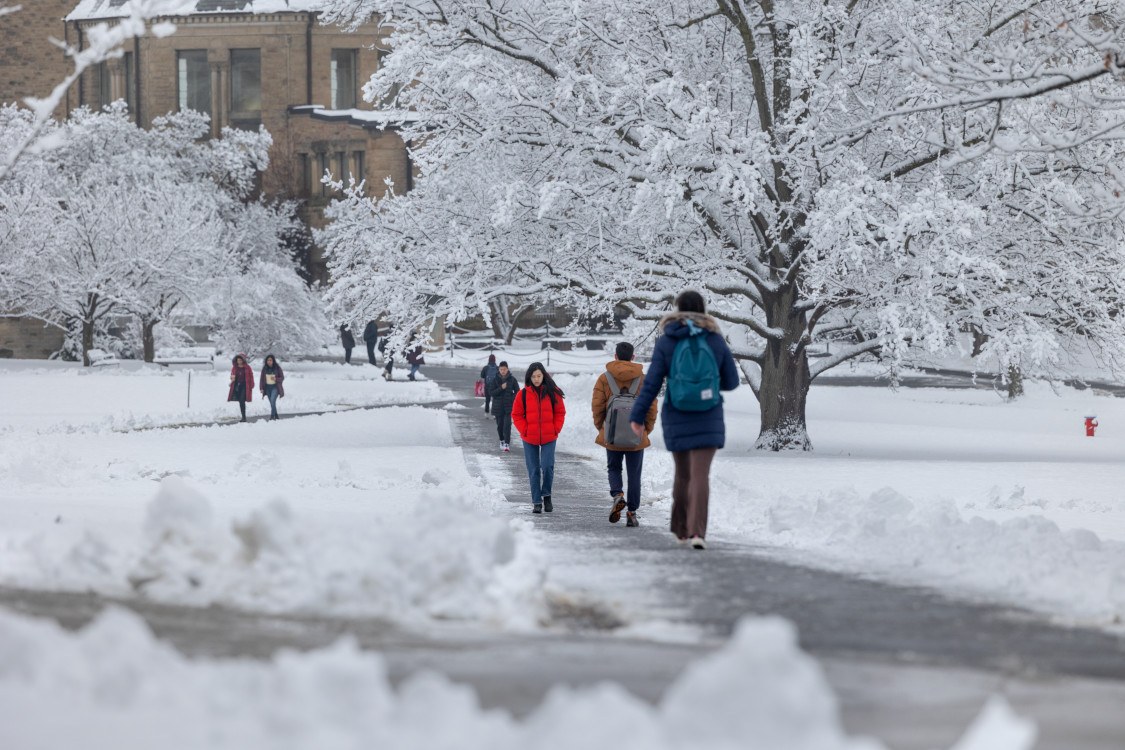When Cornell closed its campus in March 2020, the state of New York was the global hotspot for COVID-19. In the months that followed, Cornell faculty and staff worked together to create a plan to reopen campus, based on best scientific practices. The plan required every community member to make sacrifices, including a massive transition to remote work and instruction, mask wearing, rigorous testing, and limiting in-person gatherings to help stop the spread and save lives.
When students first returned to campus in the fall, no in-person student events or activities were permitted. Once university leaders were confident that the virus prevalence was low, restrictions were eased to allow for small in-person activities and gatherings as the semester progressed. These activities included both academic and a broad range of extracurricular activities—from Glee Club to Greek life. Across campus, Cornell students adapted to changing circumstances, as they improvised to sing, dance, make art, and build things together, while keeping one another and themselves safe.
We reached out to a handful of students who are active in Glee Club, the Cornell Fashion Collective, Cornell Concrete Canoe, Cornell Dance Team, and Greek life to share their extracurricular stories. We hope you are inspired by these students’ flexibility and creativity, as they figured out how to do the things they love in new ways. Their passion and commitment helped to create memorable experiences for themselves, their friends, and the larger Cornell community. Enjoy this look at extracurricular life in the time of COVID-19.
Glee Club
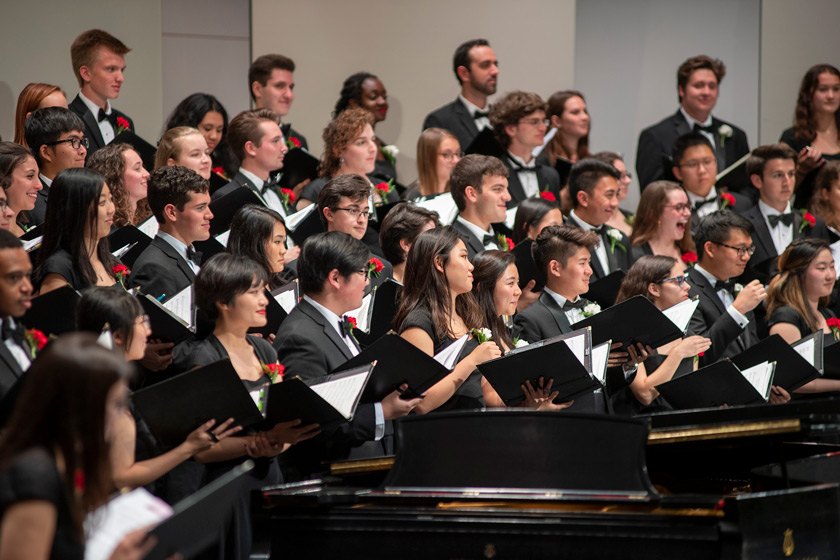
“Singing is a pretty tricky activity to do during an air-transmitted pandemic,” says Brian Rappaport, a doctoral candidate in electrical engineering and loyal member of the Cornell University Glee Club. “And singing in a group over the internet is next to impossible due to latency issues,” Brian adds.
In response to these challenges, this semester the Glee Club pivoted to focus on developing its members’ individual singing skills. Brian attends weekly voice lessons online, taught by members of the Cornell Music Department. “This is something that can be done effectively virtually, since only one person has to sing at a time,” Brian says. The cost of these lessons is partially subsidized by the Glee Club, which currently has about 40 members.
Members gather online for weekly studio meetings, in which one or two students sing and receive feedback from their peers. The club has also hosted some sight-singing classes, and members were invited to participate in a series of online lectures focusing on the lives and works of historically disadvantaged composers. A schedule of free lectures is online at ONEComposer, an organization which was co-founded by assistant conductor of the Glee Club, Steve Spinelli.
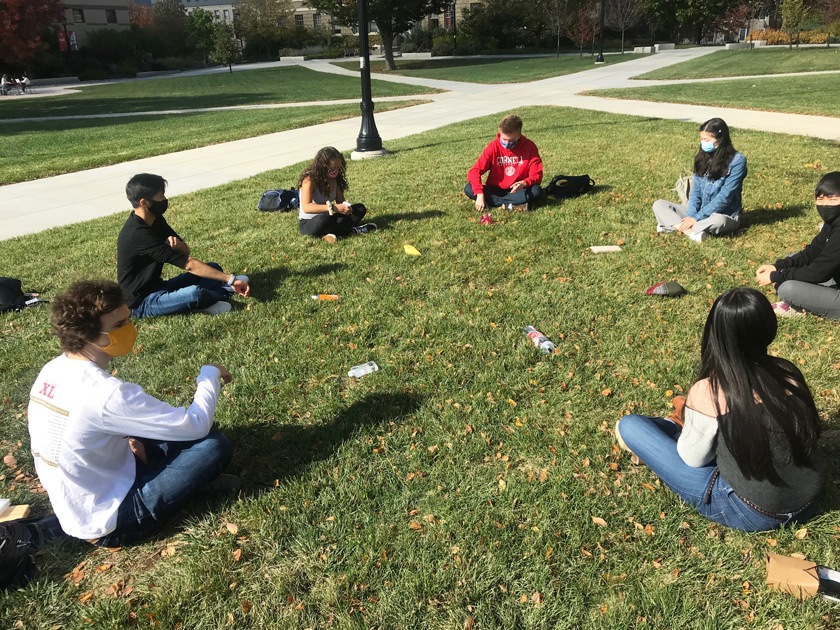
Some Glee Club members who were on campus this fall also practiced in person, in small groups called consorts. “Pursuant to all university and public health guidelines, these meetings took place outdoors, with each singer being provided a specialty singer’s mask to use and keep,” says Aidan Mahoney ’22, publicity officer for Glee Club. “Those that participated found these consorts to be great fun, and a taste of all that we have to look forward to after the pandemic concludes.”
Glee Club and Chorus officers also organized a few joint online events in fall 2020, including Zoom movie and game nights, a happy hour, and small in-person games. “These were a great way to connect our singers in Ithaca and around the world,” Aidan says. “Some events even included our alumni!” he adds.
To share their work, the Glee Club recorded a few of their songs through a painstaking process: each singer records their part separately and the recordings are spliced together to create a group performance. For example, Glee Club members partnered with Cornell University Chorus to create this recording of “Give My Regards to Davy” in honor of StayHomecoming weekend in October.
“A guide track is made beforehand by our section leaders for singers to listen to while they record,” Aidan explains. “Once all videos are submitted, the production team begins carefully stitching the recordings together, creating a cohesive and lifelike virtual choir.”
On December 16, the Glee Club and Chorus will host an online version of the popular Readings and Carols program. Readings and Carols is an annual tradition featuring performances by the Glee Club and Chorus, singalong carols, and seasonal readings by selected student, faculty, and staff. Since live performances in Sage Chapel are cancelled this year due to the pandemic, “we hope this recorded release spreads some joy this holiday season,” Aidan says. Pre-register to join in.
Cornell Fashion Collective
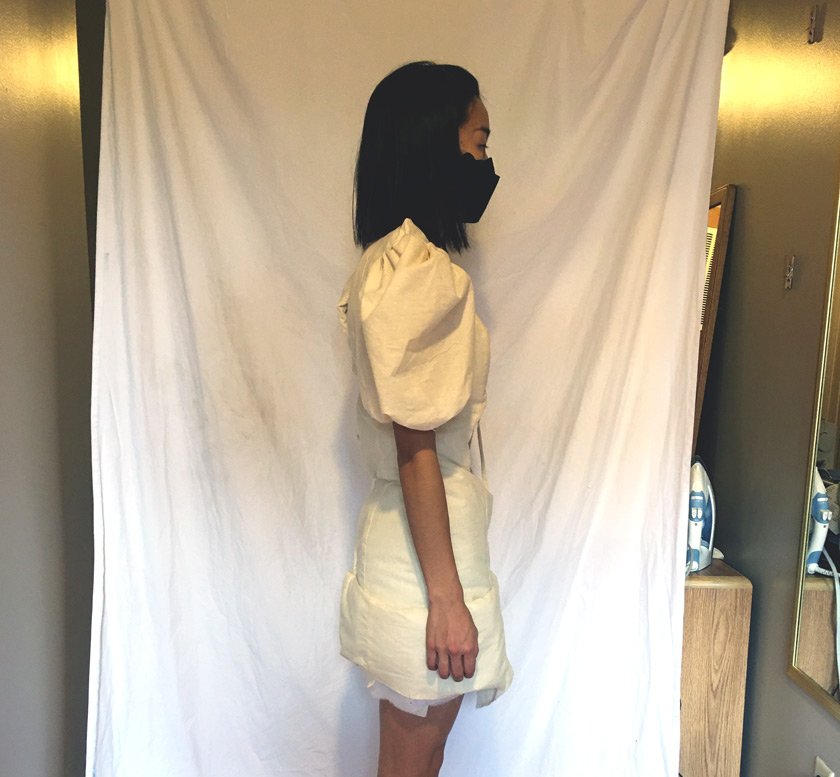
Yvonne Schichtel ’21 is a fashion design major in the College of Human Ecology. When Yvonne and her fellow fashion design students left campus in the spring, many of them had to purchase sewing machines and dress forms to enable them to work from home. “My bedroom has turned into my studio,” she says. “My roommate and I have expanded our bedroom studios into the hallway, where we have ironing boards set up and a place for fitting and documenting—since the plan to showcase our work will likely involve a video production,” she explains.
Yvonne says the biggest drawback about the move to online instruction has been barriers to collaborating with her peers in the design studio. “It is quite isolating to be working from home and to stay motivated without everyone around in studio. We are all being as resourceful as possible and problem solving on our own without professors in person.”
Because her bedroom also serves as her studio, Yvonne admits that she struggles with work-life balance. “There is no separation between rest and work,” she says. The upside of this is that she has experienced “a whole new level” of focus and dedication to her craft.
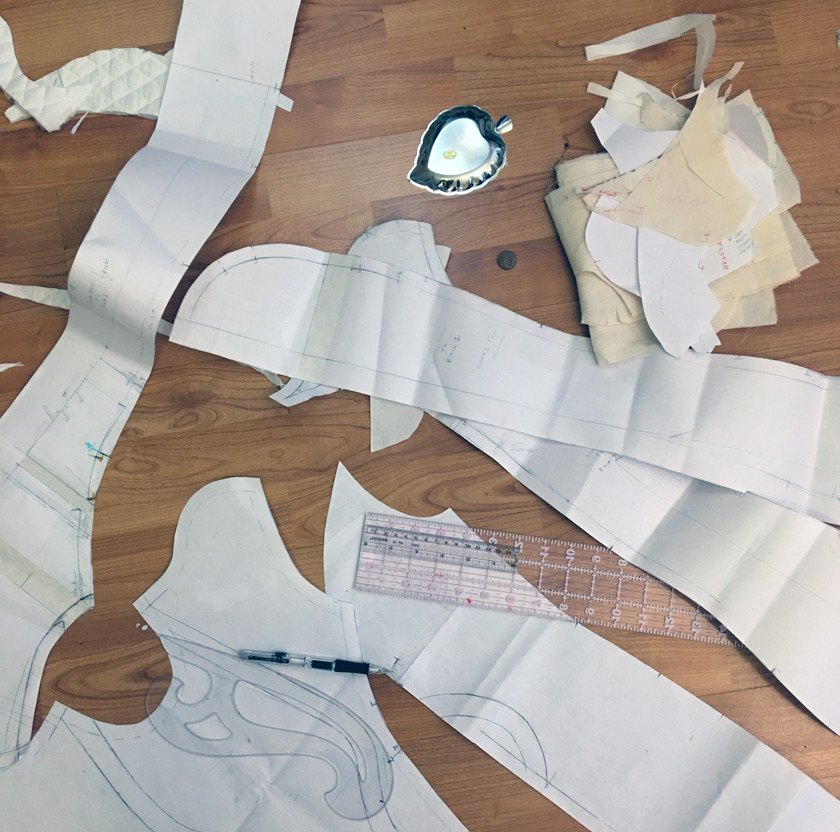
Yvonne notes that another positive outcome has been the online learning opportunities that CFC has offered members this fall. Yvonne was particularly impressed with the CFC’s Mental Health Awareness Week. “This week featured Zoom seminars and interviews with really incredible people in the industry,” she says, including Mason Spector, cofounder of Madhappy; Natasha Minter, founder and director of Modelme; Utibe Mbagwu, content associate manager at Glossier; and Jawahar Chirimar, chairperson of One Management. Yvonne was especially impressed that Spector published two Cornell students’ thoughts on “Coping in Times of Danger” on his blog.
Yvonne’s senior year is largely devoted to completing her thesis collection, which is typically shared with the Cornell community through the Cornell Fashion Collective’s (CFC) annual showcase in the spring. She has been participating in the show, which usually fills Barton Hall with a crowd of thousands of enthusiastic fans, for the past three years. “The Cornell Fashion Collective provides a platform to show and share our work at the end of the year,” Yvonne says.
Due to the pandemic, CFC is working to produce the show in a way that aligns with changing public health requirements. Sophie Wang ’21, president of CFC, says the group is planning to produce a fashion film to showcase each level of designers (first, second, third, and fourth-year students).
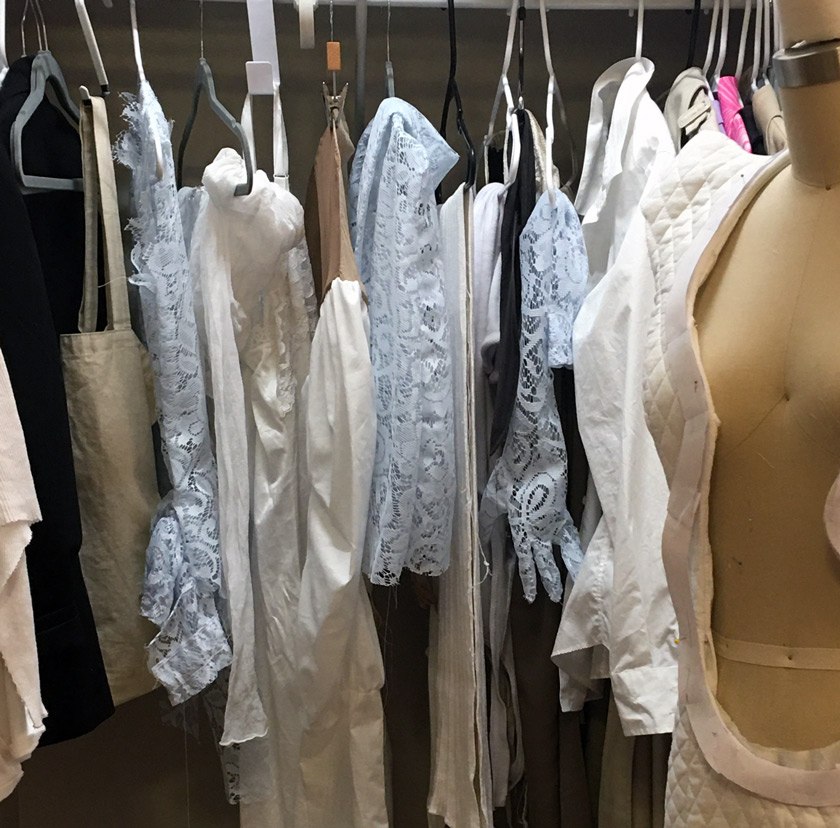
“Our goal is to showcase the work of our students in a unique and captivating manner, using the constraints of the pandemic as an opportunity to venture into something new. We hope to create a show that is more professional and engaging than ever before!” Sophie says. CFC hopes to release the film in May and make it “available to all online.” If possible, the group also hopes to host outdoor screenings on campus.
Yvonne is optimistic about the fact that this year’s show will be shared with an online, rather than a live, audience. “With the Internet, it is quite easy to share and disperse work,” Yvonne says. “I believe the expansion from only physical shows to film and digital collaboration is opening up an entire new avenue for the industry. CFC is growing, along with the rest of the fashion industry, to create new ways of sharing work,” she adds.
Updates on how to watch the CFC spring fashion film will be posted on their website.
Cornell Concrete Canoe
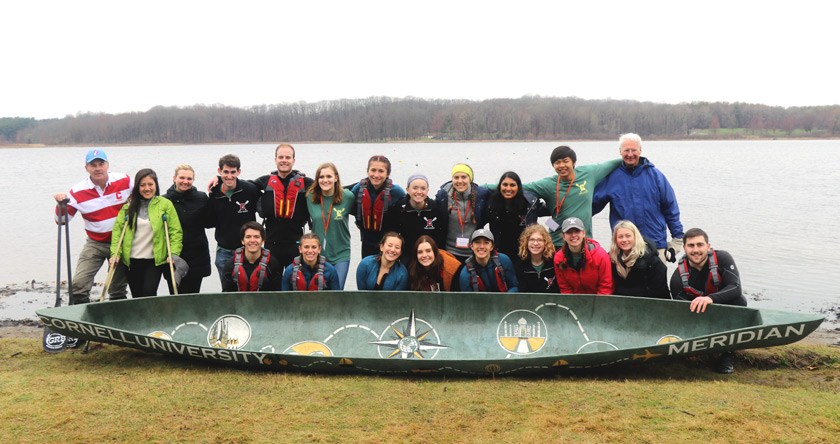
Cornell Concrete Canoe’s (CCC) tagline is “making the impossible, possible.” The goal of this undergraduate engineering project team is to design, build, construct, analyze, and race a canoe made entirely of concrete. The CCC team competes against other regional teams in the annual American Society of Civil Engineers (ASCE) Upstate New York Conference. The Cornell team has placed third in three of the last four competitions.
Unfortunately, CCC was unable to compete in spring 2020, when the race was cancelled due to the pandemic. Team lead Julia Bausano ’22 is hopeful that last year’s vessel, Polaris, will perform well. “We won’t be racing Polaris at competition because last year’s rules and this year’s rules are different. We are planning to go down to Cayuga Lake in April to see if it floats,” she says.
Julia joined the CCC team in her first year, and she says her involvement has been transformative. “Concrete Canoe has shaped my college experience by giving me the opportunity to be experimental and hands-on with my education,” she says.
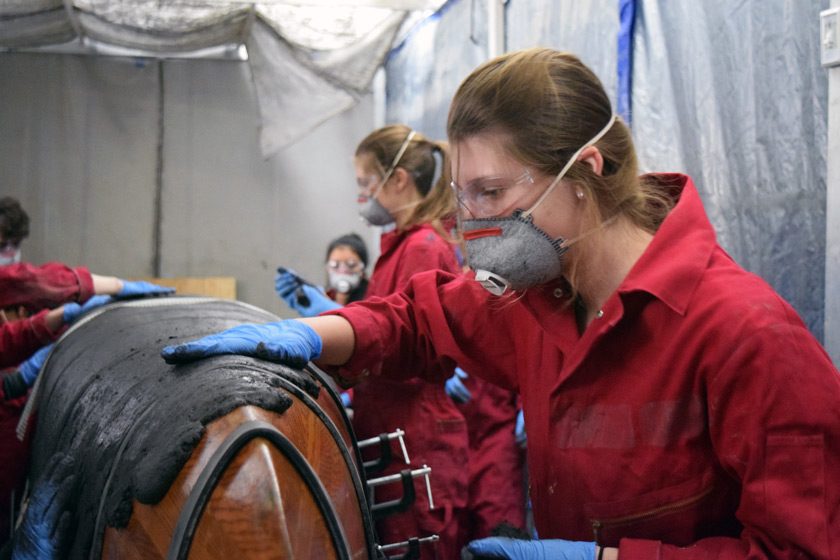
The overall CCC team has six sub-teams, each of which handles a different aspect of the project—from finding the best concrete mix, to decorating the boat with inlays in the shape of dinosaurs (this year’s theme), to paddling the boat through a series of sprint and slalom events, to securing sponsors.
The CCC team has faced numerous hurdles this semester. The team’s usual home in the Bovay Lab is currently being renovated, so the team had to relocate to the High Voltage Lab (HVL) at the start of the semester. “We moved into HVL the first weekend in October and got to work right away,” Julia explains.
“Given the modifications to the academic schedule this year and other complications with the HVL move, we only had seven weeks in the lab,” Julia reports. Due to this abbreviated timeline, the team decided to focus on creating a portion of the hull this fall, rather than an entire canoe.
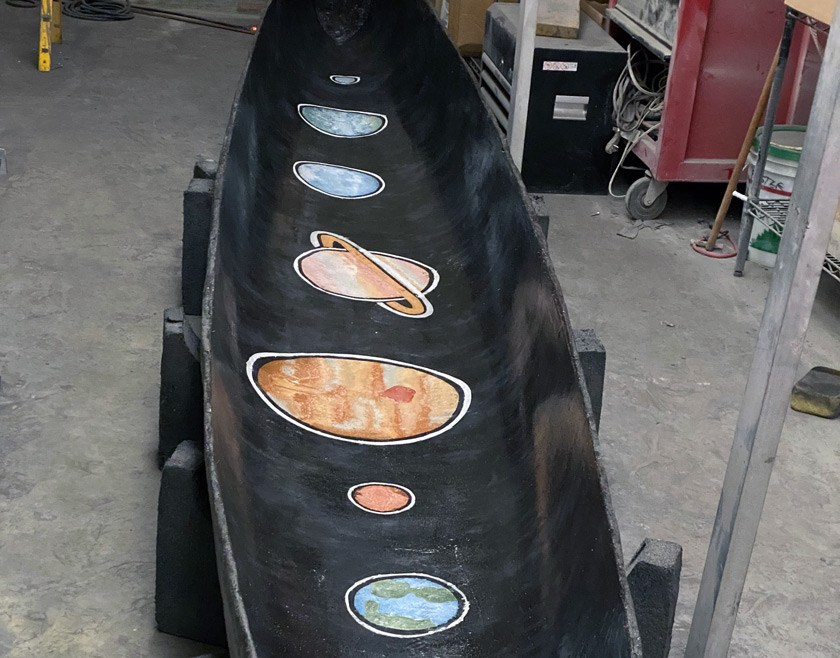
To limit the number of team members in the lab, CCC split into “pods” of six members: one from each sub-team. “Each pod had two hours in the lab per week, to work on all aspects of the boat, from creating different concrete mixes to analyzing and testing performance of the hull,” Julia explains.
Julia says that maintaining communication among the pods was challenging. “For example, each pod made different mixes, which made it difficult to cross compare within the team as a whole.” To address this challenge, CCC created a series of surveys to help quantify and qualify differences between the various mixes. “This solution has been pivotal in our mix deliberations,” she says, adding that CCC will continue using the surveys to efficiently compare mixes, even after the pandemic.
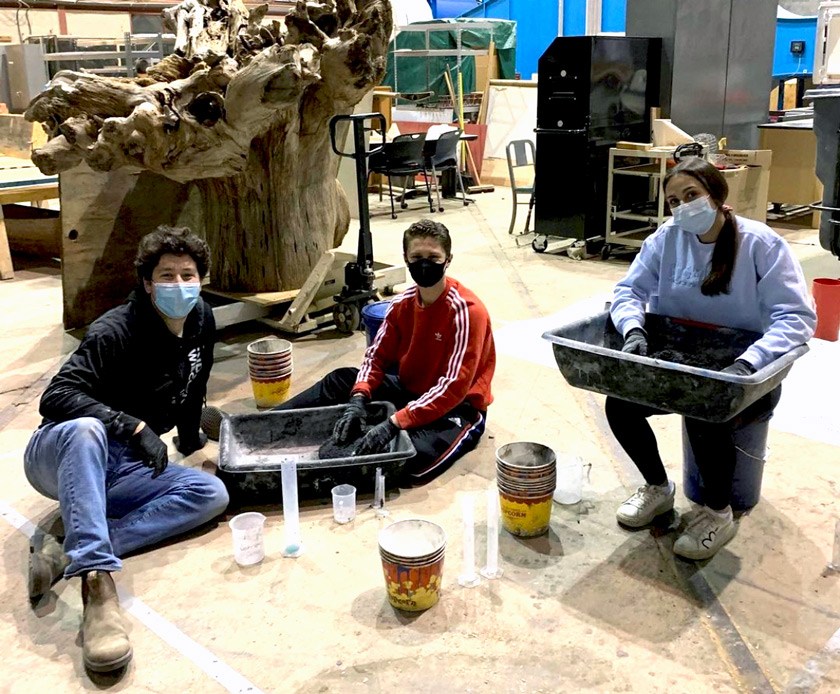
In spite of all the challenges, Julia lists many successes. The CCC team recruited ten new members in fall 2020 and successfully transitioned into their new home in HVL. “The pods enabled members of sub-teams who might not ordinarily interact with one another to collaborate and get creative with their projects,” she says.
CCC has big plans for the spring, when the team hopes to design and build a new hydration system to keep the concrete moist while it cures. “Our team has fought shrinkage cracking due to lack of proper hydration during curing for years,” Julia explains. “A new hydration system will prevent cracks from forming and help the boat reach its maximum strength,” she adds. CCC is in the home stretch of its crowdfunding campaign to raise funds for the new hydration system. Learn more and make a donation.
The 2021 race is tentatively scheduled at Clarkson University in the spring. “Clarkson will announce in January if the competition will be virtual or in person,” Julia says. Cornell will host the ASCE competition in 2022, and Julia says she is “incredibly excited” for this event during her senior year.
Cornell University Dance Team
Enjoy this routine Cornell University Dance Team created for the Big Red Thon on November 29.
“It’s hard to pinpoint what I love most about Cornell University Dance Team (CUDT),” says Amanda Hernandez ’21, CUDT president. “The people make the team. Our practices are never dull, and we have become one big family. We have each other’s backs on and off the court and stage,” she says.
CUDT has two sub-teams: the 24-member “Game Day Team” performs jazz, hip-hop, and pom routines at community fundraisers and home sporting events throughout the year, and the 14-member “Competition Team” competes against other collegiate teams at regional and national competitions.
CUDT does not have a coach, so Amanda collaborated with her teammates and her high school mentors to get the team ready to compete at the Universal Dance Association’s (UDA) 2020 National College Dance Team Championship in Orlando, Florida, in February—just before the pandemic. Cornell’s was one of 250 teams from across the country to compete, and CUDT was recognized as a D1 Jazz Semifinalist.
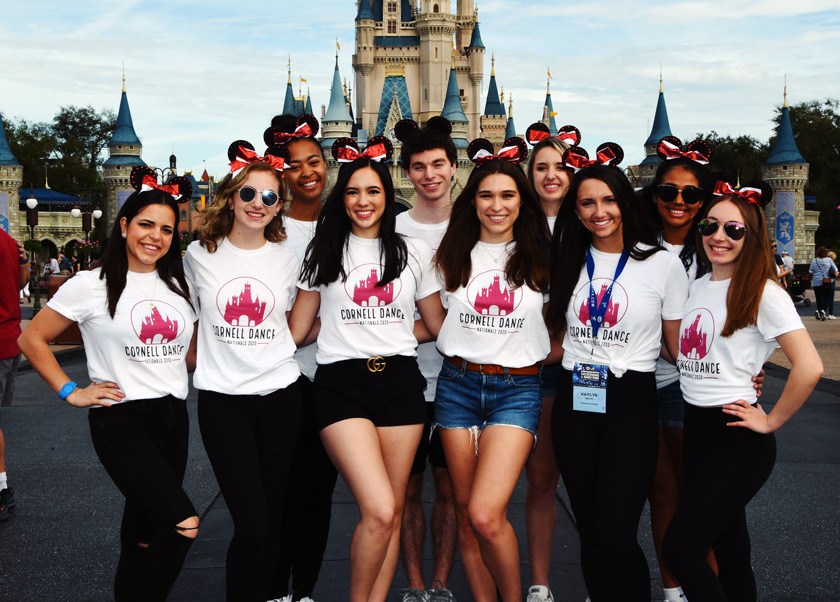
“Most teams are unable to accomplish this feat without a coach, so it was a big accomplishment for us!” Amanda says. “We are the second team in the Ivy League to compete at this level for dance, and the only competitive dance team on Cornell’s campus,” she adds.
Fortunately, CUDT recruits new members online in the spring, making the transition to online practices a little smoother. “Throughout this summer and fall we held bonding, workout, and practice sessions over Zoom,” Amanda says. “Once the regulations allowed us to meet in person, we met in smaller groups outside, and the small groups Zoomed one another so we were able to practice all together as a team,” she explains.
Amanda says the team continues to learn and practice new routines, which they hope to perform live when sporting events are allowed to resume. The team also recorded a routine in Willard Straight Hall that was shared as part of the Big Red Thon on November 29. This dance marathon raises funds for the local Children’s Miracle Network Hospital, Upstate Golisano Children’s Hospital in Syracuse, New York.
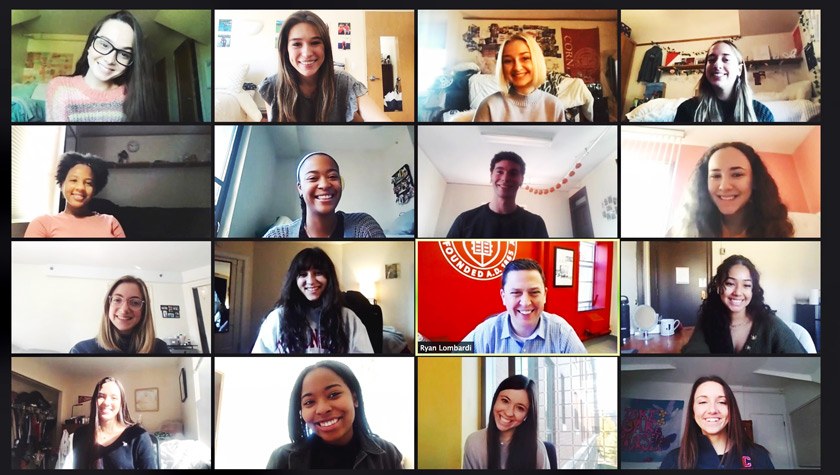
“The biggest challenge our group has faced is being able to engage each other over Zoom after being ‘Zoomed-out’ from our classes,” Amanda explains. “The ability to meet in-person in smaller groups, in a safe, socially-distant way, has helped our team tremendously,” she adds.
Amanda says team members continue to experiment with “unique ways to engage over Zoom.” Members have enjoyed an online yoga class together and cheering one another on as they practice their new routines. “Our team has adapted exceptionally well to the obstacles we have faced this semester,” Amanda says. “We will continue to host weekly virtual practices and bonding sessions throughout the winter break to keep each other motivated,” she adds, “and we hope for an even better experience next semester.”
Greek life
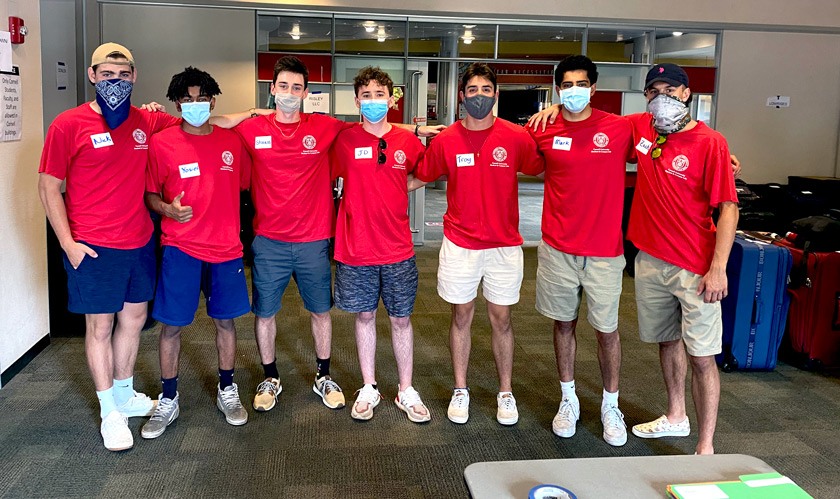
Grace Hageman ’21, president of the Panhellenic Council at Cornell, acknowledges that fall 2020 has been especially challenging for the members of the 13 sororities at Cornell. “Students are not functioning in the same way because of the amount of stress that this semester has put on them, and this may include stress from factors other than Cornell,” she says.
“We’ve found ourselves having to send out a lot of reminders,” Grace says. “I personally have been struggling to remember anything this semester because all communication comes through my devices, and it is really easy to let things slip through the cracks.”
Knowing that students are ‘Zoomed-out’ after looking at their computers all day for classes, Panhellenic has focused on finding and sharing ways to keep members engaged. The council uses multiple platforms to connect with members, including Slack, GroupMe, a listserv, Instagram, and CampusGroups—a new platform that allows groups to register their online events centrally so that they are accessible to all Cornell students. “You name it, we’re probably on it,” Grace says.
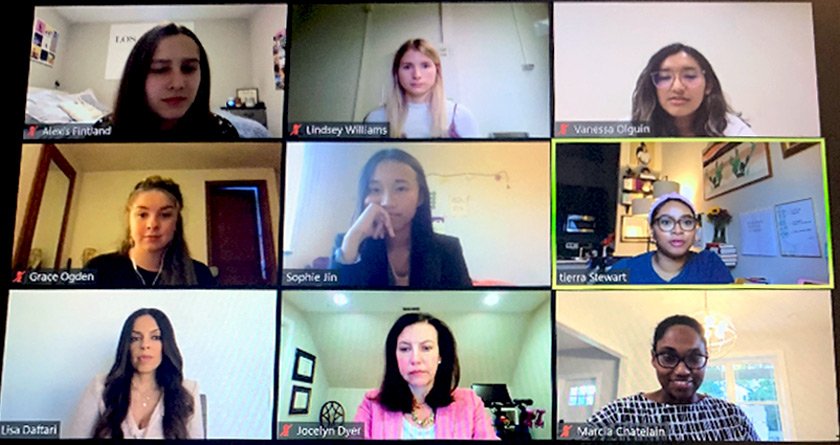
“Our programming focus has been working to help our chapters think of creative events to do with their members,” Grace says. To this end, Panhellenic has reached out to partner with other organizations on campus to mount panels and host events. The council teamed up with four other organizations to present “Womxn in Politics: Activism in the 2020 Landscape,” a panel of professional womxn sharing their experiences as activists. The council also co-hosted “Women in the Workplace: Facing the COVID-19 Crisis,” which featured high-profile women discussing the impact of the pandemic on their professional lives.
Grace is particularly proud of multiple Panhellenic efforts to get out the vote. “This semester we counted registering to vote toward our members’ community service commitment,” Grace says, “in the hopes that this small incentive would motivate members to register.” Panhellenic also collaborated with Cornell Votes to host an absentee ballot workshop on Zoom. “Cornell Votes was kind enough to create a map of polling places that our members living in chapter houses could access,” she adds.
Two sororities partnered with two fraternities on “Rock the Vote,” an effort to register 100% of their members prior to the November election. Terence Burke ’21, president of the Cornell Interfraternity Council (IFC), says this collaboration inspired him and the IFC to try to extend the voter registration drive to more chapters. “It was great to use our platform to share resources about voter registration and polling locations right up through election day,” Terence says.
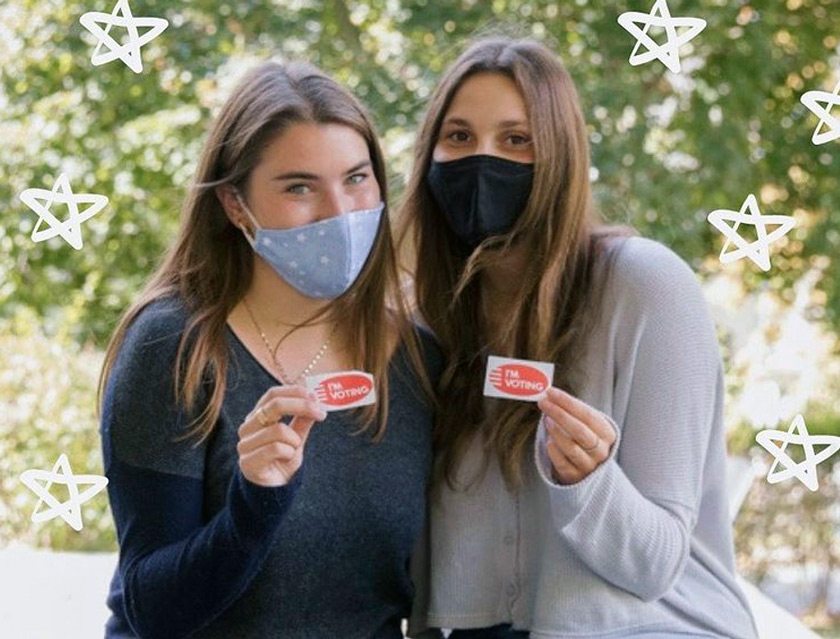
IFC members also volunteered to help with move-in and served as COVID-19 Peer Ambassadors, helping to distribute PPE and educate students about pandemic-related health and safety protocols. “When the call went out for help, several chapters happily sent members,” Terence says. Terence estimates that about 85% of IFC’s 1240 members, representing 27 chapters, returned to campus this fall.
Terence reports that IFC’s greatest pandemic-related challenge has been “setting guidelines and expectations for the physical fraternity houses, most of which house more than 10 individuals.” According to Terence, each chapter approved its own house plan for move-in and residential living.
“The Office of Sorority and Fraternity Life compiled resources from Cornell Health and from other campuses and a variety of other sources and shared them all with chapters to help them make their plans,” Terence explains. “Each chapter has different policies, but wearing masks in common spaces and limiting group sizes in certain rooms have helped keep our houses open and members safe,” he adds.
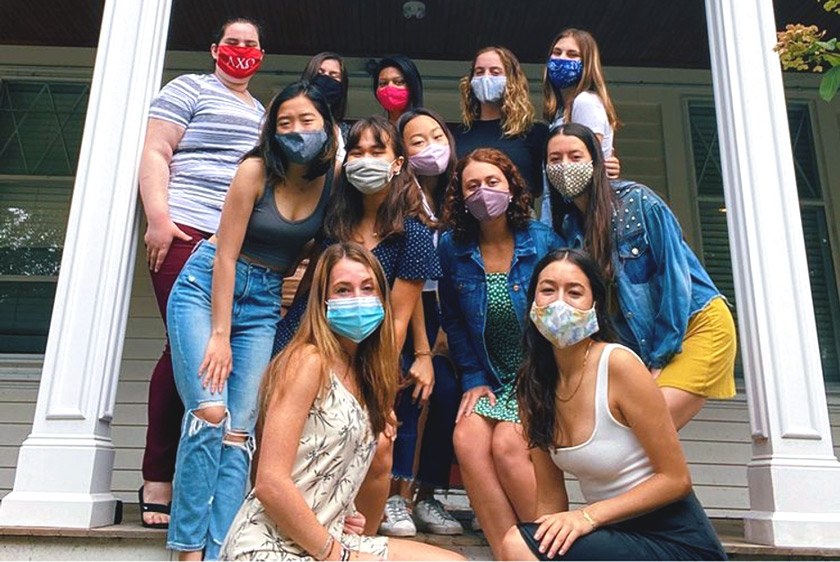
IFC chapters conducted virtual recruitment in the fall and plans to do so again in the spring. The Panhellenic Council plans to host its first virtual recruitment in January 2021.
“We’re excited to see how this works,” Grace says. “In normal, formal recruitment, potential new members would have to trek through the Ithaca snow all the way from the north side of campus to West Campus in order to meet our members. This year they will be able to participate from the comfort of their own rooms!”
In the first round of sorority rush, prospective members will visit each chapter’s Bitmoji Classroom page. These pages will feature media curated by members to introduce their chapter, including Tik Toks, Instagram pictures, and videos. The subsequent three rounds of rush will utilize the breakout room function on Zoom to allow for more personal interactions and one-on-one conversations between current and prospective members. “Making this work will rely on the efforts of all of us at Panhellenic, and in our chapters, to ensure the best process for everyone,” Grace says.
More to come
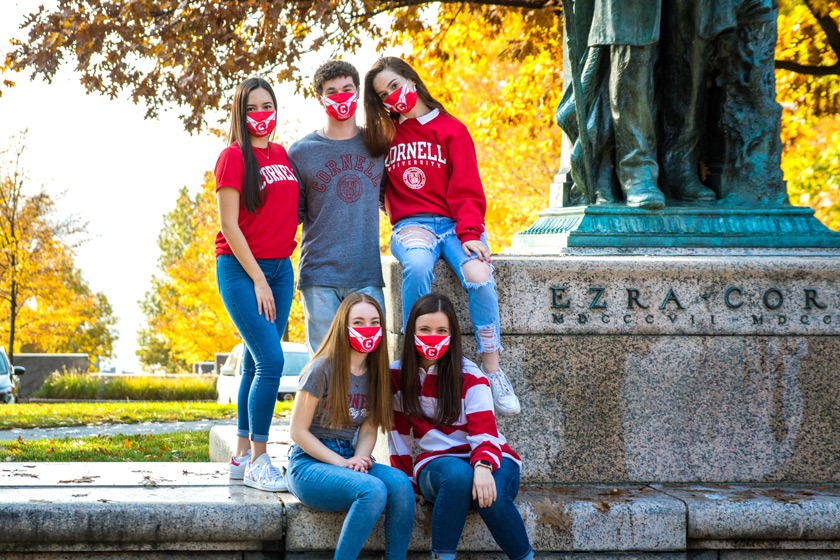
Looking ahead to 2021, Terence and Grace—along with the other students we talked to—agree that their groups will continue to do many things that have never been done before. We hope to share more stories of extracurricular life at Cornell, as our students find safe ways to get together, innovate and create, host events, serve their communities, and welcome new members in spring 2021.


